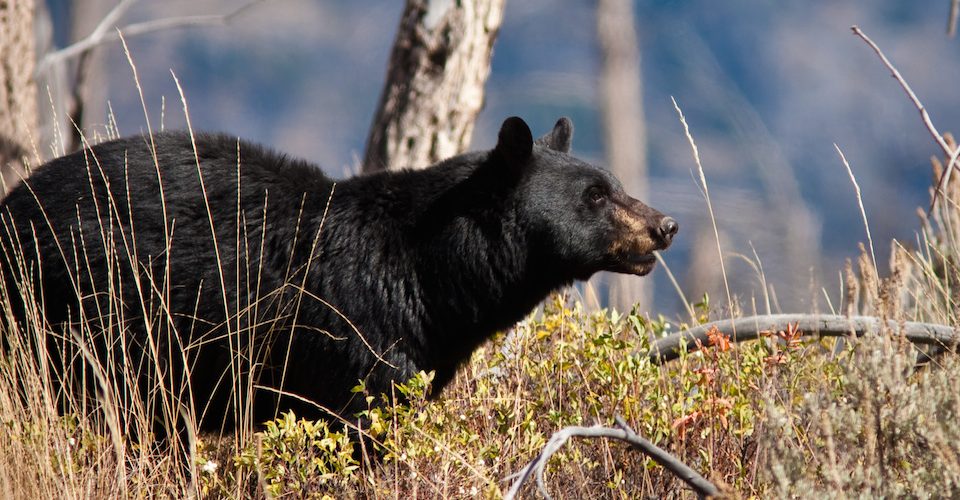Just over halfway through the reintroduced six-week spring bear hunt, which runs from May 1 to June 15, the province of Ontario has issued close to 2,300 licenses for black bears.
Unfortunately, the Ministry of Natural Resources has no idea how many of those licences will be used this spring, and how many were requested for use in the fall.
Just over halfway through the reintroduced six-week spring bear hunt, which runs from May 1 to June 15, the province of Ontario has issued close to 2,300 licenses for black bears.
Unfortunately, the Ministry of Natural Resources has no idea how many of those licences will be used this spring, and how many were requested for use in the fall.
The spring bear hunt was cancelled by Progressive Conservative Premier Mike Harris in 1999, but MNR minister David Orazietti announced in November 2013 that the hunt would return as a six-week pilot project in 2014 and 2015 and only in eight wildlife management units around Timmins, Sudbury, Thunder Bay, North Bay and Sault Ste. Marie.
The problem MNR is facing now is that each license entitles an Ontario resident hunter to kill one black bear in 2014, but would-be hunters are not required to specify whether they intend to tag a bear in spring or during the fall hunt, which occurs between August 15 and November 30, depending on the location.
“Since bear hunting licences are valid for both the spring and fall seasons, we don’t know if these licence purchasers intend to hunt bear this spring or simply bought their licenses at the same time as other big game licences and intend to hunt bear in the fall,” said MNR spokeswoman Jolanta Kowalski.
The ministry will have a better idea how popular the controversial spring bear hunt was later this summer when the results of a questionnaire spring hunters are required to submit to the government is tallied and made public.
“Hunters have until August 1 to complete their questionnaire, and an assessment of participation and harvest levels will not be available until after that time,” she said.
Hunters are allowed to kill one black bear per season, but in some wildlife management units, bear populations are strong enough that a hunter may apply for a second license. The ministry has set out strict guidelines outlawing the killing of bears within half a kilometre of a garbage dump, any bear cubs or females accompanied by cubs.
Orazietti has long maintained the reintroduction of the spring hunt is about public safety, pure and simple.
Our approach is not the reinstatement of the spring bear hunt of yesteryear. This is a more thoughtful, strategic approach.
– Minister of Natural Resources David Orazietti
Cochrane Mayor and PC candidate Peter Politis told The Agenda host Steve Paikin on April 25 that black bears in his part of northern Ontario “are getting braver and more aggressive” in their interactions with humans, occasionally wandering into people’s homes in search of food.
“We need a complete bear management program,” Politis said. “The spring hunt is not the answer, but it’s part of the answer.”
According to Orazietti, himself the long-serving MPP for Sault Ste. Marie, the latest version of the spring hunt is more “strategic” and “thoughtful” than it was 15 years ago.
“Our approach is not the reinstatement of the spring bear hunt of yesteryear,” Orazietti told me late last month before the provincial election was called. “This is a more thoughtful, strategic approach in eight wildlife management units out of 95. So it’s not a blanket approach: it targets specific areas that have high human-bear conflicts.”
And in northern Ontario at least, the hunt has been popular. More than 50 municipalities have passed resolutions asking MNR to allow them to opt into the spring hunt or have their region be considered in 2015 when the hunt returns for year two of its two-year test run.
According to the minister, allowing for a spring bear hunt is also not an uncommon practice; seven provinces in Canada currently permit them.
But the hunt has not proceeded without its detractors. Celebrity environmentalist and former The Price is Right game show host Bob Barker lashed out at the Ontario government in late February over its partial reinstatement of the hunt.
It’s not sport, it’s legislated cruelty.
– Bob Barker
“I’m shocked that Ontario would return to the barbaric, unethical practice of hunting bears in the spring, a move that will almost certainly result in tiny cubs starving to death,” Barker said in a statement. “It’s not sport, it’s legislated cruelty.”
Weeks before the hunt was slated to commence, a pair of animal rights organizations filed a lawsuit against the Ontario government over reinstating the hunt, asking an Ontario court to halt it until the case had played out. At the eleventh hour, a judge tossed out the lawsuit from Animal Alliance of Canada and Zoocheck Canada, permitting the hunt to proceed.
These groups and others have long claimed MNR’s $34.5-million Bear Wise program was adequate to keep conflicts between humans and bears to a minimum.
But Orazietti said the costly trap and relocate initiative – a part of the Bear Wise program which the government cancelled in May 2012 – was “largely ineffective” and didn’t do enough to address real safety concerns of northerners.
Bear Wise was designed to help educate northerners about the need to reduce “bear attractants” like BBQs with meat residue on the grill, bird feeders and improperly stored garbage.
“I don’t think Bear Wise failed,” Orazietti said. “The reality is that it was never designed to deal with an immediate public safety threat. That’s fallen now to police services – those are 9-1-1 calls that someone’s life is being threatened.”
Andrew Reeves is the Editor-in-Chief of Alternatives Journal. Overrun, his book about Asian carp in North America, will be published in Spring 2019 by ECW Press. His work has also appeared in the Globe & Mail, Spacing and Corporate Knights. Follow him on Twitter.













